“The man who said ‘I’d rather be lucky than good’ saw deeply into life. People are afraid to face how great a part of life is dependent on luck. It’s scary to think so much is out of one’s control. There are moments in a match when the ball hits the top of the net, and for a split second, it can either go forward or fall back. With a little luck, it goes forward, and you win. Or maybe it doesn’t, and you lose.” — Jonathan Rhys Meyers as Chris Wilton in Match Point
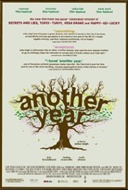 |
Another Year (2010, UK) I’m giving this movie 3.5 stars, which means that it was damn good and probably should get 4 stars, but it made me uncomfortable, on edge, and sad, so I’m knocking it down half a star. That’ll show ’em! The best synopsis is one I read at the IMDB site: “A married couple who have managed to remain blissfully happy into their autumn years, are surrounded over the course of the four seasons of one average year by friends, colleagues, and family who all seem to suffer some degree of unhappiness.” Yes on all of that. This is not a conventional movie. There’s no story as such. It’s more like being in someone else’s life for a couple of hours. At times I was confused as to who the main characters were … and at the end even more so. Perhaps all the characters were meant to be main characters. Maybe I didn’t enjoy Another Year in the sense that I’d enjoy a good Bruce Willis flick, but it affected me emotionally and gave me a lot to think about. I’ve seen one other movie by director Mike Leigh, Happy-Go-Lucky, and had a similar reaction (you can read my review here). This is a director to follow, and I will watch more of his movies. |
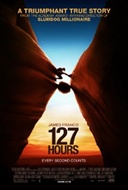 |
127 Hours (2010, USA) I was dreading this one, especially after enduring an unwatchable movie called Buried that takes place entirely inside a dark coffin (you can read my review here). Who wants to watch a guy trapped at the bottom of a narrow chasm with no possible way of getting out short of cutting off his own arm? Plus, unlike Buried, this one is based on a true story and we already know the hiker finally gets out by cutting off his own arm. Well. I’m here to tell you this is a hell of a good movie. The director, Danny Boyle, keeps the audience entertained by showing what happened before the hiker’s accident; showing the thoughts, imaginations, and hallucinations the hiker suffers while he is trapped; showing us the incredible beauty of the canyons the hiker was exploring. Okay, the bit where the hiker intentionally breaks the bones in his arm and then cuts into the flesh with a dull multi-tool? That part is pornographically disturbing, and not for children. But the rest? Fascinating. 127 Hours is definitely one to watch. |
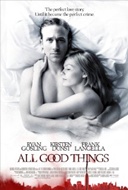 |
All Good Things (2010, USA) Not at all what I thought it was going to be; surprisingly good. It kept me on the edge of my seat all the way to the end. Some reviewers complained about slow pacing, but I didn’t feel it was slow. As Ryan Gosling’s character grows darker and he begins to go mad, every new stage of his descent is a shock. Something about this movie reminds me of Klute, but don’t ask me what because I can’t pin it down … maybe the incremental way in which the crime at the center of the story is revealed. A good movie about a very bad man, but not a movie that worships evil. |
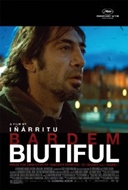 |
Biutiful (2010, France) I knew Biutiful was about a guy dying from cancer, and I knew Javier Bardem was in it. That’s all I knew, though with cancer in the mix I could guess it was going to be sad. Boy, is it ever. Biutiful is brutally sad. It’s devastating. And you might think, if you’ve read my reviews of other sad movies, I’d rather have spent two hours with a good book. Not so, and that’s owing to Javier Bardem, who is brilliant as Uxbal. But it’s not just Javier. It’s the location, Barcelona as the underclass experiences it. It’s Marical Alvarez, who plays Uxbal’s manic-depressive wife Maramba. It’s the illegal Chinese and Senegalese immigrants Uxbal both exploits and tries to help, and the squalor they live and die in. It’s Uxbal’s kids. Biutiful is just the most engrossing story, and it’s told straight, with no embellishments (save for the two short scenes that open and close the movie). I was moved. I want to learn to appreciate my life. I want to be a better person. Not many movies make me say stuff like that … even fewer make me mean it. |
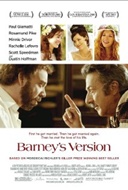 |
Barney’s Version (2010, USA) The previews lead you to believe this is merely a light romantic comedy about a guy who falls in love with another woman at his own wedding, then pursues that woman. That bit’s in here, but it’s just that, a bit. There is much more to this movie; in fact it is the story of a life, with a huge cast and at least a dozen sub-stories, messy and, well, lifelike. One of the big-name reviewers said of this movie that the parts are greater than the whole, and perhaps that’s true, but the parts (some funny, some sad, some shocking) are more than worth it. Paul Giamatti, Dustin Hoffman, and Rosamund Pike are all brilliant. My only quibble comes at the very end, when the mystery of Barney’s friend Boogie’s disappearance is finally explained. Everything else in this movie was so good, I felt the producers and scriptwriters let us down by falling back on a crappy urban legend we’ve all heard a hundred times. |
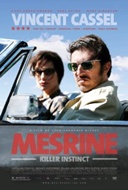 |
Mesrine: Part I – Killer Instinct (2008, France) Jacques Mesrine must have been one busy homme. This nearly two-hour movie, based on the life of France’s most notorious criminal, covers only the highlights of his life of crime, and it’s just part one of two. At first, it’s like watching The Godfather in fast forward, slowing down only for the shooty bits, but then it hits you that this is about a real guy who actually did all these things, and you start to pay closer attention. By the end of part one, I was rooting for Mesrine, and can’t wait to see part two! This could well be another Godfather, something you’d want to have in your DVD library. |
 |
Battle: Los Angeles (2011, USA) Part of me likes most of this movie; part of me hates some of it; another part of me recognizes it for what it is: a cheesy B movie with better-than-normal special effects. Okay, what I like is the almost nonstop action. There’s an absolute minimum of scene-setting before the alien invasion starts, and from that point on it’s busy busy busy. What I don’t like are the maudlin pauses and soul searching every time another marine gets killed. Marines who would pull shit like that in action would very quickly be dead marines. My dawning recognition that this is at heart a 1950s drive-in B movie started with those soulful, cliche-ridden breaks in the action. Then there are all the cliffhangers with the little kids, and the heroic civilian dad who dies trying to defend the marines who are defending his kid. Then there’s the plucky Air Force female. Then there’s the ooh-rah ending. But you know what? All in all it’s great fun! Seriously, once this movie starts, you can’t not watch it. |
 |
Max Manus (2008, Norway) A film about the WWII exploits of Max Manus, resistance fighter and saboteur during the German occupation of Norway. Pretty exciting stuff, particularly the mining of Nazi shipping in Oslo harbor, all, as far as I can tell, utterly true. The film is also true enough to honestly cover Manus’ drinking and other problems; easy to understand considering the number of fellow underground fighters lost to the Nazis, not to mention the large number of innocent Norwegian lives lost to Nazi reprisals. Production values and acting are top rate throughout, yet there is a distinctly non-Hollywood feel to the movie … which is a good thing, in this case. |
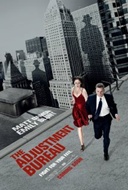 |
The Adjustment Bureau (2011, USA) I was excited about watching The Adjustment Bureau. Any movie based on a Philip K. Dick story has to be a kick, right? Oops … not after Hollywood gets its hands on it. Matt Damon is terrific, of course, ditto the production values and cinematography, but the producers turned it into a variant of the old Hollywood standby, the “friendly angel” movie. By the end, The Adjustment Bureau had moved into full risk-free nondenominational religious mode, miles away, I’ll wager, from anything Philip K. Dick ever wrote. But hey, if your goal is maximizing box office receipts, being daring is a risk you don’t want to take. This could have been a great movie … damn you, Hollywood! |
 |
Match Point (2005, UK) What an interesting movie! It starts slowly, but once it builds momentum it’s unstoppable. Sadly, I suspect impatient viewers will drift away during the first 40 minutes, as I confess I nearly did. Most of the beginning seemed like an immersion into British upper class life, and my background being the antithesis of that, I simply wasn’t interested. But then the illicit affair between Chris and Nola starts, and I went from being uninterested to acutely uncomfortable: god, the situations people put themselves into, the lies they tell, the tightropes they walk (Woody Allen is really good at that stuff). Jonathan Rhys Meyers’ character Chris doesn’t grow much during the movie, but Scarlett Johansson’s Nola undergoes a great transition, from sexy little wannabe actress to full blown woman — she becomes the most compellingly real character in the movie, and that alone is a joy to watch. Later in the film it dawned on me that Woody Allen was channeling Dostoevsky, and that the early scene of Chris reading Dostoevsky was there for a reason. With an Allen film, every scene is there for a reason. I didn’t realize the significance of the opening shot of a tennis ball hitting the top of the net until the later shot of a stolen wedding ring hitting the top of a guard rail on the bank of the Thames, which floored me. The climax is not only Dostoevskian, it’s Shakespearian. Get through the first 40 minutes. Trust me. It’s worth it. |